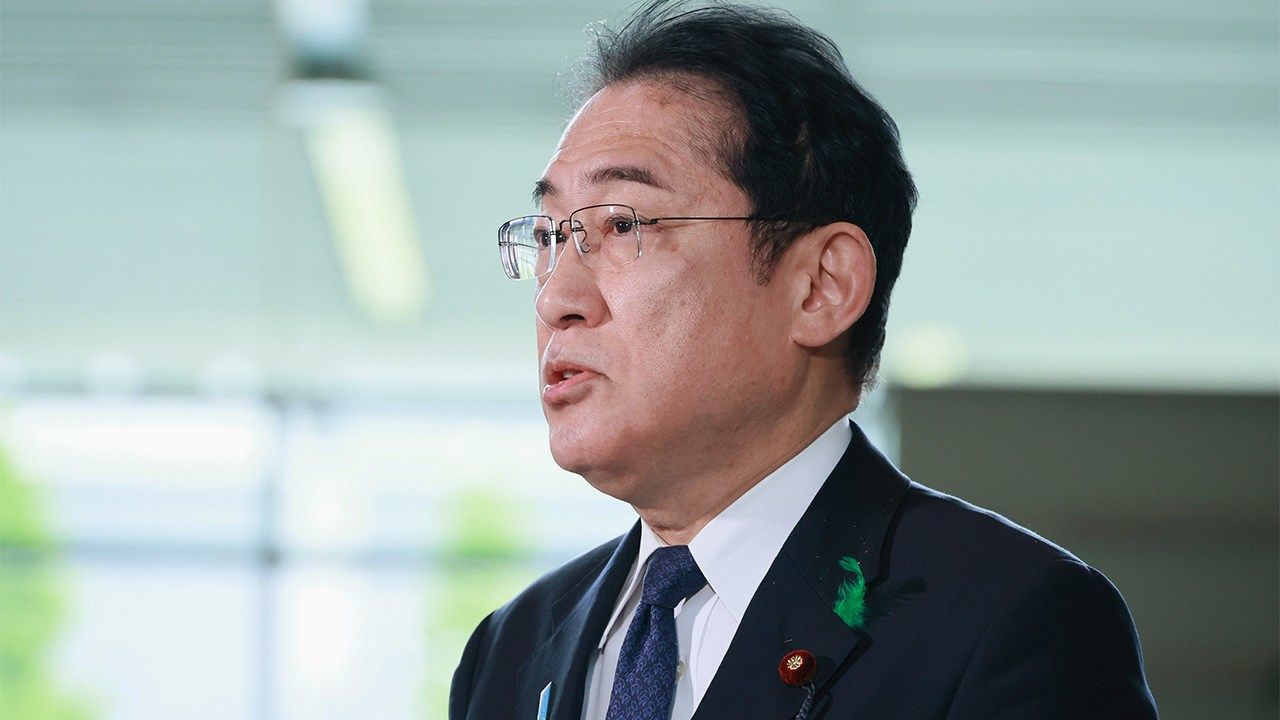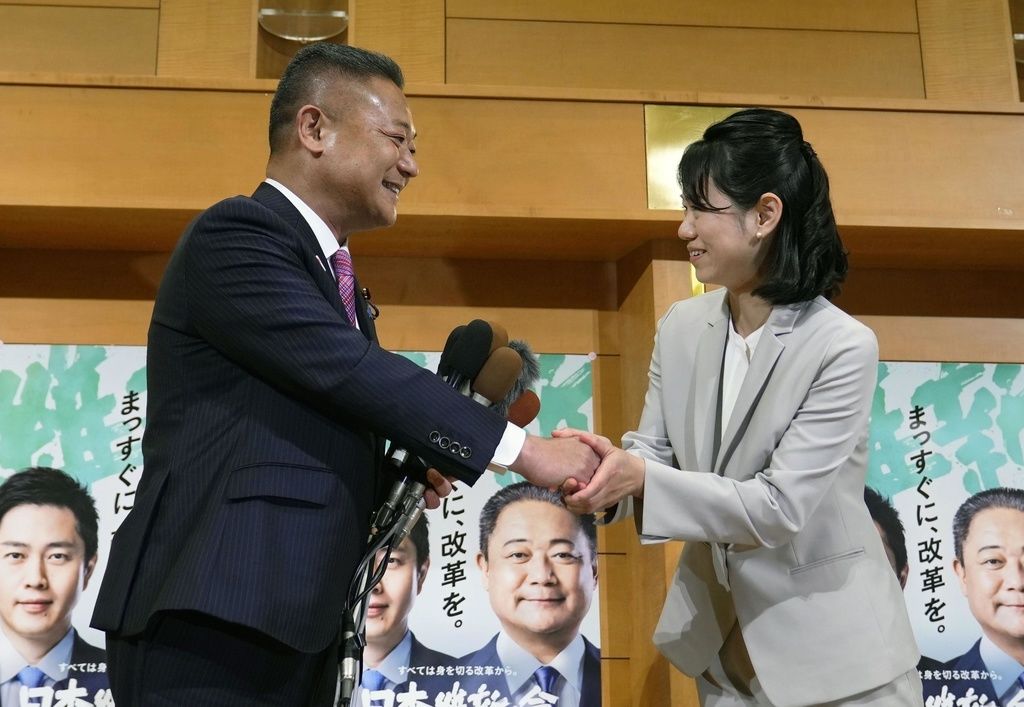
Political Success for Ishin no Kai Pushes Prime Minister Kishida Fumio to the Abe Course
Politics Economy- English
- 日本語
- 简体字
- 繁體字
- Français
- Español
- العربية
- Русский
A Difficult Call for a Snap Election
LDP Secretary-General Motegi Toshimitsu expressed pride in the April 23 election results, saying, “The people have given Prime Minister Kishida Fumio a favorable evaluation.” However, the opposition party Nippon Ishin no Kai (Japan Innovation Party) managed to take a former LDP seat in the Wakayama 1 constituency. Apart from the Yamaguchi 4 constituency previously held by Prime Minister Abe Shinzō, the LDP’s other by-election victories were also much closer than expected.
Ishin’s looming presence will likely have a major impact on the Kishida administration’s future. Nominally in the opposition camp, Ishin has suffered criticism as being a “supplement to the ruling party” due to its close connections to the administrations of the late Abe Shinzō and Suga Yoshihide. However, it has recently reversed course and taken a hard stance against Kishida. The party’s increase in influence, also seen during the first round of unified elections that took place on April 9 to choose prefectural governors, prefectural assembly members, and mayors and assembly members for key cities across the nation, has been considerably greater than reported in the media.

Hayashi Yumi shaking hands with Ishin no Kai chief Baba Nobuyuki (left) on April 23, 2023, after winning the House of Representatives seat for the Wakayama 1 constituency. (© Kyōdō)
The question now is when Kishida will decide to dissolve the Diet for a snap election. Opinions predicting a dissolution coming soon after the end of the G7 Summit in Kishida’s hometown of Hiroshima have not entirely vanished, but given Ishin’s current momentum, a decision on the timing will not be an easy one for the prime minister to make. And to further complicate matters, Kishida will most certainly be keeping Ishin in mind in his future policy decisions.
Uncertain Goals
I am skeptical whether we can actually call the results of these five Diet by-elections a “midterm assessment,” though. Any real assessment would need to take into account what it is that Kishida actually wants to accomplish.
Looking at the key issues for constituencies with by-elections shows voters paying attention to a range of issues, none of which were closely related to Kishida administration policies. In the Chiba 5 district, the focus was on the interplay of politics and money, following the resignation of the LDP’s Sonoura Kentarō in the wake of a funding scandal. In the Yamaguchi 2 district, vacated by former Minister of Defense Kishi Nobuo due to health reasons, the focus was on the appropriateness of dynastic politics as his son, Kishi Nobuchiyo, stepped up to run for his father’s seat. And in the Yamaguchi 4 constituency once held by Abe Shinzō, all eyes were on the contest as one giving voters a choice on commemorating the slain prime minister by electing Yoshida Shinji, the LDP candidate backed by Abe’s widow Akie.
What exactly is it that Kishida been trying to achieve, on which voters might be called to pass judgment? Is it not a reversal of the neoliberal politics that continued under the Abe and Suga administrations, with Kishida himself saying he would build a “new form of capitalism?”
He has seemingly been trying to push the LDP back toward a more centrist path from its recent, more conservative tack. The LDP has held onto power for so long because it has managed to skillfully adjust course through frequent change of leadership even as the same party has stayed at the top. That is likely something that Kishida—who hails from the Kōchikai faction within the LDP, with its focus less on a more robust military stance for the country, and more on economic issues—remains keenly aware of.
However, when it comes to “correcting” Abe’s policies, meaning moving away from the courses charted by Abe, politics dependent on the late prime minister are clearly still in effect. You could call this an unprecedented situation, and even a warped one, in some respects.
Concern for the Abe Faction
The following exchange happened at a House of Representatives Budget Committee session on February 15 this year. In a discussion about the longstanding issue of a system allowing married couples to choose different surnames, Representative Nishimura Chinami of the Constitutional Democratic Party confronted Prime Minister Kishida, asking “Are you opposed to it?” Kishida answered, “I have never said that I oppose it myself.”
Kishida was a member of a committee created by the LDP calling for the creation of a system allowing married couples to select separate surnames. However, he has given no clear indication he maintains that positive stance since his win in the 2021 LDP premiership election.
However, what if a Diet member opposed to the change had asked if the prime minister was in favor of amending the law at that same meeting? I wonder if perhaps Kishida might have answered, “I have never said that I am in favor of it myself.” It could well be a bureaucrat’s way of thinking that is keeping him from making a clear commitment, but it also makes me wonder whether he even has a well-defined stance to clearly express.
“And what of the politician’s way of evading the issue by saying things like it still needs consideration, or the people have differing opinions?” Nishimura struck back at Kishida. Her words were harsh, but in a way she got directly at the core of the issue.
One opinion I often hear is that Kishida bases his positioning around considerations of hardliners in the LDP’s more conservative factions. Of course, the LDP’s conservative direction, including the party’s hesitance to back things like selective surnames, was led by Abe. Even after his shooting death in July 2022, the Abe faction remains the largest in the LDP. It only makes sense for Kishida to want to avoid antagonizing this bloc.
Putting off Key Financial Issues
In the autumn 2021 LDP presidential contest, Kishida campaigned around an equitable-distribution policy he called a “new form of capitalism,” pledging stronger taxation of financial assets. This drew attention as a major change from Abe Shinzō’s Abenomics program.
Then the stock market plunged, and intraparty criticism intensified. Memory is still fresh of how quickly and easily Kishida put the issue on the backburner. At that moment, it seemed clear there was room to doubt whether he actually had any firm convictions at all.
At the end of March 2023, Kishida put forward a tentative plan for “unprecedented countermeasures for the falling birthrate.” It included expanding the scope of allowed child-rearing support payments and raising rates of men taking parental leave, with the government pledging to focus on these initiatives over the next three years. However, nothing in it was new enough to convince the public that this was “unprecedented.” It was hard to avoid the impression that it was just a loose collection of policies aimed at delivering largesse to various constituencies.
Nor have we seen any guidance on how the administration intends to secure the financing needed for these measures, presenting yet another key issue that is being put off. Will it involve increased social insurance fees or tax hikes? Making either choice will certainly displease the public, and no one knows if Kishida can achieve consensus within the LDP to do so.
In contrast, Kishida has decided to dramatically increase defense spending, to seek offensive capabilities allowing Japanese forces to attack enemy bases, and to reverse the government’s policy of reduced dependence on nuclear power, in place since the March 2011 accident at TEPCO’s Fukushima Daiichi Nuclear Power Station, instead maximizing nuclear use.
LDP Vice President Asō Tarō praised the prime minister, saying, “Kishida is doing what Abe couldn’t. He is showing more leadership than Abe.” But these were all just pending issues that Abe had left undone. In the current LDP, there is a pervasive atmosphere where, if you say, “this is Abe’s will,” it gets done. We cannot see this as Kishida exhibiting decisiveness.
Ishin’s Success and a Return to Conservativism
In March of 2023, Kishida visited a childcare support facility in Sōma, Fukushima Prefecture. When the children asked, “What made you want to become prime minister?” Kishida responded, “To do what you want to do, and to stop what you want people to stop doing, you need to be strong. In Japanese society, the person with the greatest authority of all is the prime minister, so I decided to become prime minister.”
It seems clear why he wanted this position. But what did he want to do after getting it? If the position itself was his goal, then did he not have policies he wanted to enact? That is the doubt that arises.
Turning once again to the question of Nippon Ishin no Kai’s surge on the political scene, I note that one LDP official has said, “The firm conservative base the Abe administration built crumbled when Kishida took office, and Ishin no Kai has further eroded it.” This is a truly serious issue for the ruling party.
Ishin no Kai is looking to split the LDP. To that end, they could possibly start working with former Prime Minister Suga Yoshihide’s group within the LDP, which represents the closest thing to an ideological ally for them. That is what Kishida fears most.
The only way to stem this trend is for Kishida to return to conservatism, or rather, return to Abe’s path. To restore unifying power within the LDP and gain Ishin’s cooperation, Kishida is likely to do something like push for the constitutional reform that was both “Abe’s will” and something that Ishin has also actively sought. I believe these five by-elections signified a turning point toward exactly that.
(Originally published in Japanese. Banner photo: Prime Minister Kishida Fumio speaks at a press conference at the prime minister’s official residence on April 24, 2023. © Jiji.)